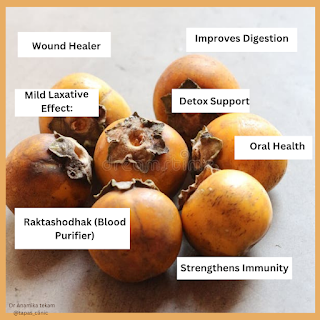Ever Heard of the Tribal Apple? Meet Tendu! – The Tribal Superfruit with Ancient Roots
Ever Heard of the Tribal Apple? Meet Tendu! – The Tribal Superfruit with Ancient Roots
**Tendu Phal** (fruit of *Diospyros melanoxylon*) is valued in traditional Indian medicine, especially in Ayurveda and folk healing systems. Though the tendu tree is more commonly known for its **leaves used in beedi making**,
People refer to Tendu (Diospyros melanoxylon) as the "Tribal Apple" for several reasons, blending cultural, ecological, and nutritional significance:
🌿 1. Forest Abundance, Like Apples in Orchards
-
Just as apples are common in temperate regions, Tendu is widely found in the forests of central and eastern India, especially in Adivasi (tribal) areas.
-
For tribal communities, it's as common and important as apples are to urban or temperate populations.
🏞️ 2. Tribal Staple Fruit
-
Tendu is a seasonal fruit collected and consumed by Adivasi communities across India.
-
It’s eaten raw when ripe and is a familiar childhood fruit for many in these regions — much like apples are for others.
🌳 3. Cultural Symbol
In Adivasi life, tendu isn't just a fruit — it's part of their identity, seasonal rhythms, and forest economy.
The term “Tribal Apple” helps bridge the understanding between forest-dwelling cultures and mainstream urban audiences by drawing a relatable comparison.
🍎 4. Nutritional & Medicinal Value
-
Tendu fruit is rich in antioxidants, vitamin C, and fiber, offering various health benefits.
-
In Ayurveda and folk medicine, it’s used for digestion, cough, and skin issues — again, similar to how apples are associated with general health ("an apple a day...").
**Ayurvedic and Medicinal Benefits of Tendu Phal:**
1. **Deepana & Pachana (Improves Appetite and Digestion):**
* Tendu phal is mildly astringent and helps balance *Kapha* and *Pitta doshas*.
* Useful in managing diarrhea, dysentery, and digestive sluggishness.
2. **Raktashodhak (Blood Purifier):**
* The fruit has detoxifying qualities that support liver and blood purification.
3. **Vrana Ropana (Wound Healing):**
* The pulp is sometimes used externally to promote healing of wounds and skin infections.
4. **Anti-inflammatory & Antioxidant:**
* Rich in tannins, it helps reduce inflammation and combats oxidative stress.
5. **Good for Oral Health:**
* Traditionally used to treat mouth ulcers, gum inflammation, and sore throat.
6. **Strengthens Immunity:**
* The fruit contains vitamins and natural compounds that support immunity.
7. **Mild Laxative Effect:**
* In ripe form, it may help relieve constipation gently.
- Notes:
Always ensure the fruit is ripe or sun-dried before use.
Not recommended in pregnancy without medical advice.
If sourcing the fruit is difficult,
Nature’s wisdom lies in our forests — let’s rediscover it!








Comments
Post a Comment